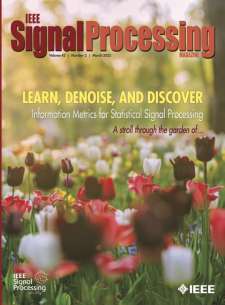- Our Story
- Publications & Resources
- Publications & Resources
- Publications
- IEEE Signal Processing Magazine
- IEEE Journal of Selected Topics in Signal Processing
- IEEE Signal Processing Letters
- IEEE Transactions on Computational Imaging
- IEEE Transactions on Image Processing
- IEEE Transactions on Information Forensics and Security
- IEEE Transactions on Multimedia
- IEEE Transactions on Signal and Information Processing over Networks
- IEEE Transactions on Signal Processing
- IEEE TCI
- IEEE TSIPN
- Data & Challenges
- Submit Manuscript
- Guidelines
- Information for Authors
- Special Issue Deadlines
- Overview Articles
- Top Accessed Articles
- SPS Newsletter
- SigPort
- SPS Resource Center
- Publications FAQ
- Blog
- News
- Dataset Papers
- Conferences & Events
- Community & Involvement
- Professional Development
- For Volunteers
- Information for Authors-OJSP
-
Home
Conferences Events IEEE Signal Processing Magazine IEEE SPL Article IEEE TIFS Article IEEE TMM Article IEEE TSP Article Jobs in Signal Processing Lectures Machine Learning Seasonal Schools Signal Processing News SPM Article SPS Distinguished Lectures SPS Newsletter Article SPS Webinar SPS Webinars SPS Webinar Series Webinar webinars
-
Our Story
What is Signal Processing?

The technology we use, and even rely on, in our everyday lives –computers, radios, video, cell phones – is enabled by signal processing. Learn More » -
Publications & Resources
-
SPS Resources
- Signal Processing Magazine The premier publication of the society.
- SPS Newsletter Monthly updates in Signal Processing
- SPS Resource Center Online library of tutorials, lectures, and presentations.
- SigPort Online repository for reports, papers, and more.
- SPS Feed The latest news, events, and more from the world of Signal Processing.
-
SPS Resources
-
Conferences & Events
-
Community & Involvement
-
Membership
- Join SPS The IEEE Signal Processing Magazine, Conference, Discounts, Awards, Collaborations, and more!
- Chapter Locator Find your local chapter and connect with fellow industry professionals, academics and students
- Women in Signal Processing Networking and engagement opportunities for women across signal processing disciplines
- Students Scholarships, conference discounts, travel grants, SP Cup, VIP Cup, 5-MICC
- Young Professionals Career development opportunities, networking
- Get Involved
-
Technical Committees
- Applied Signal Processing Systems
- Audio and Acoustic Signal Processing
- Bio Imaging and Signal Processing
- Computational Imaging
- Image Video and Multidimensional Signal Processing
- Information Forensics and Security
- Machine Learning for Signal Processing
- Multimedia Signal Processing
- Sensor Array and Multichannel
- Signal Processing for Communication and Networking
- Signal Processing Theory and Methods
- Speech and Language Processing
- Technical Working Groups
- More TC Resources
-
Membership
-
Professional Development
-
Professional Development
- Signal Processing Mentorship Academy (SigMA) Program
- Micro Mentoring Experience Program (MiME)
- Distinguished Lecturer Program
- Distinguished Lecturers
- Distinguished Lecturer Nominations
- Past Lecturers
- Distinguished Industry Speaker Program
- Distinguished Industry Speakers
- Distinguished Industry Speaker Nominations
- Industry Resources
- IEEE Training Materials
- Jobs in Signal Processing: IEEE Job Site
-
Career Resources
- SPS Education Program Educational content in signal processing and related fields.
- Distinguished Lecturer Program Chapters have access to educators and authors in the fields of Signal Processing
- Job Opportunities Signal Processing and Technical Committee specific job opportunities
- Job Submission Form Employers may submit opportunities in the area of Signal Processing.
-
Professional Development
-
For Volunteers
-
For Board & Committee Members
- Board Agenda/Minutes* Agendas, minutes and supporting documentation for Board and Committee Members
- SPS Directory* Directory of volunteers, society and division directory for Board and Committee Members.
- Membership Development Reports* Insight into the Society’s month-over-month and year-over-year growths and declines for Board and Committee Members
-
For Board & Committee Members
Popular Pages
Today's:
- Information for Authors
- (ICME 2026) 2026 IEEE International Conference on Multimedia and Expo
- Submit a Proposal for ICASSP 2030
- IEEE Transactions on Information Forensics and Security
- IEEE Transactions on Multimedia
- Submit a Manuscript
- Conference Call for Papers
- Access Restricted
- Information for Authors-SPL
- IEEE Transactions on Image Processing
- IEEE Transactions on Signal Processing
- IEEE Journal of Selected Topics in Signal Processing
- IEEE Signal Processing Letters
- Unified EDICS
- (CAI 2026) IEEE Conference on Artificial Intelligence 2026
All time:
- Information for Authors
- Submit a Manuscript
- IEEE Transactions on Image Processing
- IEEE Transactions on Information Forensics and Security
- IEEE Transactions on Multimedia
- IEEE Transactions on Audio, Speech and Language Processing
- IEEE Signal Processing Letters
- IEEE Transactions on Signal Processing
- Conferences & Events
- IEEE Journal of Selected Topics in Signal Processing
- Information for Authors-SPL
- Conference Call for Papers
- Signal Processing 101
- IEEE Signal Processing Magazine
- Guidelines
Last viewed:
- Kolkata Section
- IEEE Transactions on Information Forensics and Security
- IEEE Transactions on Computational Imaging
- (ICSM 2025) 2025 International Conference on Smart Multimedia
- Explore Career Opportunities at the IEEE Virtual Career Fair (USA)
- Editorial Board
- Information for Authors
- 2025 IEEE SPS Chapter Initiative: S.P.A.R.C. – Signal Processing, AI & Real-time Computing Camp
- About TMM
- IEEE JSTSP Special Issue on Advanced AI and Signal Processing for Low-Altitude Wireless Networks
- Information for Authors-SPL
- HNR-ISC: Hybrid Neural Representation for Image Set Compression
- SPS Scholarship Program
- IEEE Transactions on Multimedia
- SPS BISP TC Webinar: Brain Hacking Rare Vascular Disease: Novel Methods for Brain Age, White Matter Hyperintensity and Functional Connectivity on a Newly Collected CADASIL Dataset
Teaching Signal Processing Through Frequent and Diverse Design: A Pedagogical Approach
You are here
Publications & Resources
Signal Processing Magazine
For Authors
Top Reasons to Join SPS Today!
1. IEEE Signal Processing Magazine
2. Signal Processing Digital Library*
3. Inside Signal Processing Newsletter
4. SPS Resource Center
5. Career advancement & recognition
6. Discounts on conferences and publications
7. Professional networking
8. Communities for students, young professionals, and women
9. Volunteer opportunities
10. Coming soon! PDH/CEU credits
Click here to learn more.
Teaching Signal Processing Through Frequent and Diverse Design: A Pedagogical Approach
In this article, we describe and discuss the design-based approach for signal processing education at the undergraduate level at the University of New South Wales (UNSW) Sydney. The electrical engineering (EE) undergraduate curriculum at UNSW Sydney includes three dedicated signal processing courses as well as a design course that involves a major signal processing task. Design- and project-based teaching permeate the curriculum and form a primary method of content delivery to not only cement the understanding of theoretical concepts but also strengthen students? ability to apply these concepts to practical problems.
In this article, we describe and discuss the design-based approach for signal processing education at the undergraduate level at the University of New South Wales (UNSW) Sydney. The electrical engineering (EE) undergraduate curriculum at UNSW Sydney includes three dedicated signal processing courses as well as a design course that involves a major signal processing task. Design- and project-based teaching permeate the curriculum and form a primary method of content delivery to not only cement the understanding of theoretical concepts but also strengthen students’ ability to apply these concepts to practical problems.
The incorporation of design-based teaching in the curriculum has been led by the signal processing group, with the pedagogical strategies evolving over nearly two decades of experience and innovation. The approach to project- and design-based teaching is based on the tenets of frequency, diversity, anchorage, significance, and autonomy. These tenets ensure that design projects are formulated in a way that conforms to Kolb’s theory of experiential learning while simultaneously encompassing Bloom’s taxonomy. Evidence is presented to demonstrate the effectiveness of the teaching strategy.
SPS Social Media
- IEEE SPS Facebook Page https://www.facebook.com/ieeeSPS
- IEEE SPS X Page https://x.com/IEEEsps
- IEEE SPS Instagram Page https://www.instagram.com/ieeesps/?hl=en
- IEEE SPS LinkedIn Page https://www.linkedin.com/company/ieeesps/
- IEEE SPS YouTube Channel https://www.youtube.com/ieeeSPS
Home | Sitemap | Contact | Accessibility | Nondiscrimination Policy | IEEE Ethics Reporting | IEEE Privacy Policy | Terms | Feedback
© Copyright 2025 IEEE - All rights reserved. Use of this website signifies your agreement to the IEEE Terms and Conditions.
A public charity, IEEE is the world's largest technical professional organization dedicated to advancing technology for the benefit of humanity.












